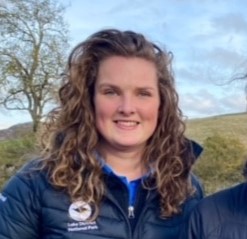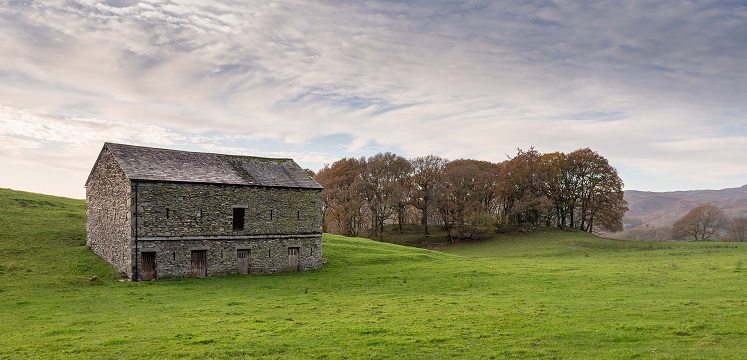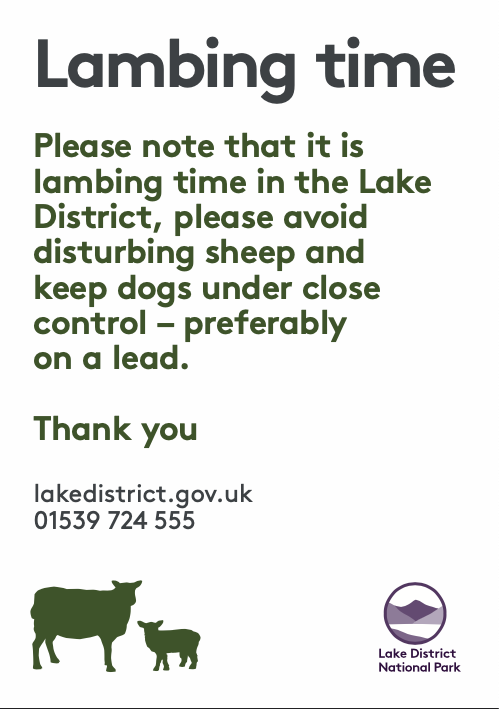Farming has a special place in the Lake District National Park at the heart of its communities, a core part of the economy and shaping the landscape over centuries that millions of people love to visit every year. And it has a vital part in the National Park’s future, evolving to continue to deliver high quality livestock and a healthy environment.
Farming practices reflect how Lake District farmers have always worked in some of the most challenging land in the county and indeed the country. It therefore comes as no surprise that 90 percent of the designated Less Favoured Areas of Cumbria are in the Lake District. This means farming is characterised by sheep and beef production. The Lake District is famous for its native Herdwick sheep, and the Herdwick Breeders Association has secured Protected Designation of Origin status for “Lakeland Herdwick”. Other important sheep breeds include the Rough Fell, Swaledale, and North of England Mule.

Claire Foster works with the farming community across the Lake District National Park, to help farmers learn from and support each other.

Eliza Hodgson works with the farming community across the Lake District. Her main focus is to help to deliver the Farming in Protected Landscapes programme.

Our handle is @FarmingLakes - Farming Lakes Twitter
The distinctive communal farming system, including common land, hefting, the field systems, and drystone walls has evolved over at least one thousand years. This heritage and the landscape it has created are at the core of the Lake District’s Special Qualities and its “Outstanding Universal Value” in its case for inscription as a World Heritage Site.
The hill farming system and the landscape reflect the use of the land from the valley floor to the fell-top in a series of enclosures from in-bye in the valley bottom, through intake, out-gang, out onto open fell land. The open fell includes the largest concentration of Common Land in Great Britain.
Hefted Grazing, collective management of land, traditional breeds including Herdwick sheep, communal gathering of sheep from the fell, Shepherds’ Meets, agricultural shows and local dialect combine in an unique heritage. Examples include Eskdale Show, Borrowdale Shepherds' Meet and Show; extensive Herdwick hefts on the the Duddon, Seathwaite, Torver, Coniston Common; and Yew Tree Farm at Coniston with its traditional buildings, Herdwick sheep and thriving local meat business.
Upland hill farming is one of the key activities which have shaped the Lake District’s cultural landscape. It has contributed so much to the Lake District we see today and will continue to do so in the future. However, farming in the Lake District presents its own unique combination of challenges. These challenges present risks to the future management and appearance of the Lake District, including its cultural traditions. Issues such as an ageing farming population, future land ownership and tenancy changes, the changing nature of subsidy and Common Agricultural Policy (CAP) reform will all have a bearing on how farming manages the cultural landscape.
Whilst we continue to recognise the importance of, and support, traditional upland farm and management practices in order to manage and protect the attributes of Outstanding Universal Value, it is also important that farming continues to evolve. Farmers and land managers must be supported to maintain the health and welfare of livestock, protect and enhance natural resources (for example: wildlife, carbon storage and water quality), and make greater efficiencies by using new technology and sources of energy to reduce costs.
We want to ensure land continues to be managed and farmed in a sustainable way in the Lake District, recognising that farms need to be financially viable and sustainable, and that the structure of farming and land management is changing due to a range of global economic pressures and subsidy reform, which makes income from farming unpredictable. Helping farm businesses to be profitable in a way that conserves the overall Outstanding Universal Value and Special Qualities of the Lake District is fundamental for them to be sustainable and continue to effectively manage the land. It is their land management practices ultimately that create the cultural landscape, which is of Outstanding Universal Value in its own right, but this also underpins the visitor economy, which is so heavily relied upon.
The Lake District National Park Partnership has agreed its Plan for the National Park, including its strategies for farming
Link to Partnership Plan (Draft)
See Section 3.2 Prosperous Economy:
Partnership Plan Strategies
PE1 – Profitable land management, farming and forestry industries
PE2 – Maintaining traditional land-based skills
See section 3.1 Spectacular Landscape, Wildlife and Cultural Heritage:
Partnership strategy
SL1 – A world-class living cultural landscape

Download and print out our lambing sign
The run up to lambing time is a really sensitive time in the Lake District. Dogs can cause significant stress to sheep whilst they are heavily pregnant and this can lead to the sheep aborting its lambs. It is really important at this time of year to follow the Countryside Code and keep dogs under close control, preferably on a lead.
It is also important to pick up after your dog as dog mess can pass on infections to livestock.
Printable lambing signAgricultural shows have a long history in the UK, stretching back as far back as 1768. A key part of rural life, farmers work towards these events all year and are proud to attend with stock they have put their hearts and souls into producing.
There are many shows across the Lake District National Park, and no two are the same. The National Park has been sponsoring the shows for the past ten years and we hope our support helps ensure these shows can continue; they are a key part of our farming communities’ cultural heritage.
We will publish dates for shows and Shepherd Meets in 2025 here. We are still waiting for confirmation on some dates.
Ings Sheepdog Trials, Thursday 7th August 2025. Hill Farm, Ings, LA8 9QQ. The Sheep Dog Trials run all day and also there are 3 hound trails (1pm, 2.15pm and 2.45pm), a dog show at 1pm open to all, trade and craft stands and refreshments.